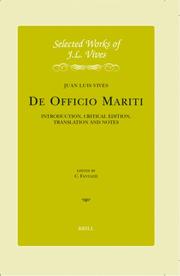| Listing 1 - 2 of 2 |
Sort by
|

ISBN: 9004154043 9789004154049 9786611400675 128140067X 9047411056 Year: 2006 Publisher: Leiden Brill
Abstract | Keywords | Export | Availability | Bookmark
 Loading...
Loading...Choose an application
- Reference Manager
- EndNote
- RefWorks (Direct export to RefWorks)
This treatise is a sequel to Vives' On the Education of the Christian Woman , published in Brill's series, Selected Works of J.L. Vives. It studies the institution of marriage from a male vantage point, with interesting observations on female psychology, anticipating his later work, De anima. Vives insists more here on the weakness and instability of the woman than in the previous treatise, relying on the biological tenets of Aristotle and Galen. Much attention is given to the choice of a wife and to the husband's role as tutor of his spouse and disciplinarian. The marriage debt is regarded as a necessary evil, as in St. Paul, while the spirituality of the union is exalted. The book was often printed together with the De institutione feminae Christianae and even considered as a fourth book of that work.
Neo-Latin literature --- Marriage --- Social ethics --- Women --- Education --- Ethics --- Social problems --- Sociology --- Social ethics. --- Education of women --- Women's education --- Education. --- Mariage --- Ouvrages avant 1800

ISBN: 128140067X 9786611400675 9047411056 9789047411055 9004154043 9789004154049 Year: 2006 Publisher: Leiden; Boston : BRILL
Abstract | Keywords | Export | Availability | Bookmark
 Loading...
Loading...Choose an application
- Reference Manager
- EndNote
- RefWorks (Direct export to RefWorks)
This treatise is a sequel to Vives' On the Education of the Christian Woman , published in Brill's series, Selected Works of J.L. Vives. It studies the institution of marriage from a male vantage point, with interesting observations on female psychology, anticipating his later work, De anima. Vives insists more here on the weakness and instability of the woman than in the previous treatise, relying on the biological tenets of Aristotle and Galen. Much attention is given to the choice of a wife and to the husband's role as tutor of his spouse and disciplinarian. The marriage debt is regarded as a necessary evil, as in St. Paul, while the spirituality of the union is exalted. The book was often printed together with the De institutione feminae Christianae and even considered as a fourth book of that work.
Marriage --- Social ethics --- Women --- Ethics --- Social problems --- Sociology --- Education --- Education of women --- Women's education --- Social ethics. --- Education.
| Listing 1 - 2 of 2 |
Sort by
|

 Search
Search Feedback
Feedback About UniCat
About UniCat  Help
Help News
News